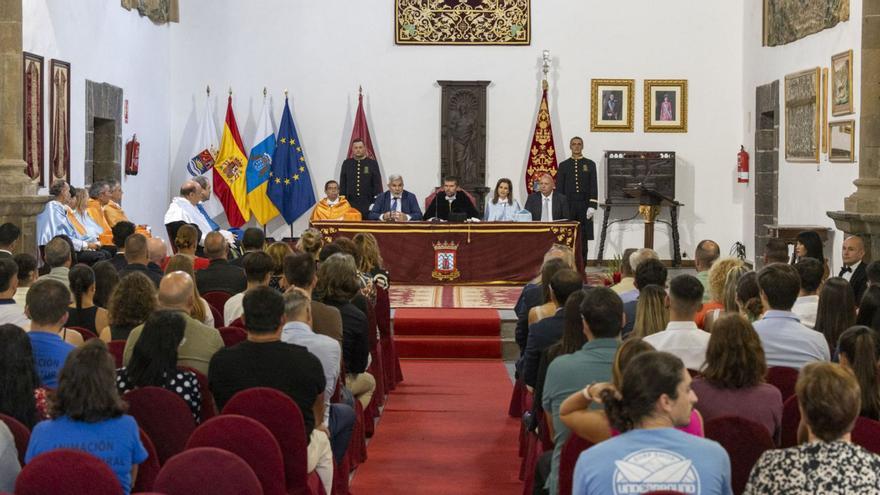
Adeje opens a new edition of the academic year of the Tourism Degree of the University of La Laguna (ULL) with the inaugural lecture by Professor of Human Geography Moisés Simancas Cruz, who addressed the need to demystify the demonization of tourism. Is it necessary to reinvent the tourism model of Canary Islands? was the title of the conference. In his reflections he did not omit the shadows of the tourism model but he wanted to provide the lights. “Tourism serves to improve the quality of life of residents’ communities,” he stressed, adding: “If that does not happen, you have a bad tourism model.”
Moisés Simancas reflected that The Canary tourism model “is constantly reinventing itself” and, many times, it is blamed for adverse effects that, in reality, are caused by the dominant economic model, not by tourism itself. “It is true that we have a mass model focused on accommodation, an economy of agglomeration, but the model has been changing and there are now more decentralized relationships with the territory, since today’s tourists seek authenticity and experiences,” stood out. For this reason, he reported that the entire offer has gone from concentrating all the offer in a few municipalities specialized in the sector, to all 88 Canarian municipalities being touristic. “Now, it is as important to have five-star accommodation as it is to have rural municipalities,” he stated.
The institutional opening ceremony of the course was chaired by the rector of the ULL, Francisco García Rodríguez, and the mayor of Adeje, José Miguel Rodríguez Fragawho were accompanied by the Councilor for Culture and Education, Adolfo Alonso, and Vice-Rector for University Extension, Lis Karely. Lionand vice dean of the Tourism degree, Ángel Chinea.
We must open a debate on tourism but with expert and prepared people
For the rector of the University of La Laguna, the inaugural lecture is “an opportunity for reflection and a sample of everything that university knowledge can contribute to a sector as important as tourism.” «It also represents an opportunity to analyze the path traveled, review pending tasks and pose new challenges. This innovative experience has already graduated eight classes“, clarified Francisco García, for whom “the success of this project on the South campus has been possible thanks to the sincere collaboration of this City Council, which has clearly opted for the public university as a powerful tool for social transformation and equity. ». Furthermore, he highlighted the economic contributions made by public universities in Spain as a whole, representing 2.2% of GDP and that in the case of Canary Islands universities, “this contribution is even greater, reaching 2.5%.”
The mayor of Adeje highlighted the importance of an initiative that “responds to a historical need.” «Education is a fundamental value and an essential resource to serve the local community. An initiative that requires the support, direction and active participation of our main academic institution. It is imperative to re-boost and resize this initiative that has already brought success to hundreds of students,” said José Miguel Rodríguez Fraga. «We need spaces for deep reflection and meaningful debates. It’s not about sending a tweet or a WhatsApp message; “This is something much more serious,” he explained.
The success of the degree is due to the sincere collaboration of this City Council
Regarding the presentation, the mayor of Adeje commented that Moisés Simancas’s lesson has been “very timely” because this debate “we can and should open, but with expert and prepared people who analyze it in a calm and well-thought-out manner.” A measure that Simancas proposed precisely in his intervention was «the need for a Pact for Tourism in the Canary Islands, which could very well be led by the two Canarian public universities. «The current tourism model generates almost 800,000 jobs, so it is really very difficult to propose an alternative. It is better to bet on a diversification of the economy in which tourism is a engine “starter that drives the rest of economic activities,” he made clear.
He also wanted to highlight the long history of the sector in the Canary Islands, which has generated accumulated knowledge that “should be more and better exploited.” For this reason, he believes it is “necessary” to focus on education both in the vocational training and university fields, “trying to ensure that this training covers all the links in the production chain, from when the client is recruited until they are at their destination.” . Precisely this close collaboration between the University of La Laguna and the Adeje City Council was praised by both the rector, Francisco García, and the mayor of the host municipality, José Miguel Rodríguez Fraga.















